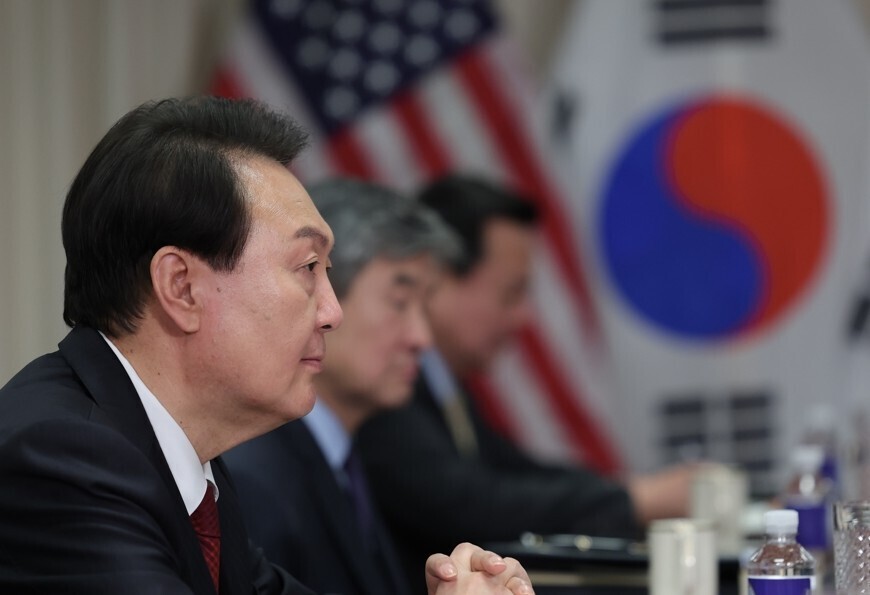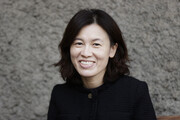hankyoreh
Links to other country sites 다른 나라 사이트 링크
[Column] Year 1 of Yoon Suk-yeol’s broken compass diplomacy


By Park Min-hee, editorial writer
The Washington Declaration that emerged from the recent South Korea-US summit showed how experienced the US is with diplomacy. It gave the impression of offering South Korea the gift of a written commitment to extended deterrence amid its fears over North Korea’s nuclear and missile programs — but a bigger goal for Washington was to fully squelch Seoul’s move toward its own nuclear armament.
After President Yoon Suk-yeol’s remarks last January about how South Korea “could acquire its own nuclear capabilities,” the US called him to the White House and had him make a declaration that there would be no nuclear development. Here, too, the US had China in mind.
The Washington Declaration is unsettling to Beijing, since it means a US ballistic missile submarine will be arriving in East Asia. But by stopping South Korea from pursuing nuclear development, it also heads off a potential nuclear proliferation domino effect that might extend to Taiwan and elsewhere.
A senior official with the Joe Biden administration explained that China had been briefed beforehand, with the US making it “very clear” why it was taking this step. Yoon needs to recognize the true nature of this situation: Washington may be feuding and competing with Beijing, but behind the scenes, the nuclear powers are coordinating their interests among themselves.
Yoon seems to have gone into this visit resolved to remove China from South Korea’s diplomatic equation entirely.
Delivering a speech in English before the US Congress on April 27, Yoon declared, “Together with the US, Korea will play the role as a ‘compass for freedom.’ It will safeguard and broaden the freedom of citizens of the world.”
In effect, he pledged that South Korea would stand at the forefront of the anti-China forces under US direction. Before departing for his US visit, he provoked China with remarks in a Reuters interview where he drew comparisons between inter-Korean relations and the Taiwan issue.
In the current situation in East Asia, peace and stability in the Taiwan Strait are crucial. With this comparison between Taiwan and inter-Korean relations, Yoon’s remarks give the impression of Seoul taking the first step in rocking the “one China” policy. It’s a statement that could only have serious side effects.
Yoon also targeted China with remarks on May 2, when he asked, “What do they want us to do when they won’t take part at all in sanctions [against North Korea]?” He insisted that South Korea “does not have a choice” and questioned, “What did the previous administration see in return for its China-friendly actions?”
This was an example of a South Korean president publicly sharing his view that there is no need for us to be on good terms with China, and that our only option lies with the US.
Diplomatically, Yoon has had a very busy year. But with each passing summit, South Korea’s diplomatic principles are shaken up a bit more, while the momentum for growth keeps waning.
In his diplomatic approach, Yoon has adopted a map and compass where only the US and Japan loom large, while North Korea, China and Russia have been omitted completely.
This may go some way in explaining why he remained peculiarly silent through all his many speeches and press conferences in the US about the difficulties that South Korean businesses have been facing due to American protectionism and the battle for technology dominance between the US and China.
Perhaps he harbors delusions of South Korea no longer “needing” China in terms of diplomacy or economic relations, where any South Korean companies that suffer losses in China can make up for them in the US market. Without offering any sort of solution for the complex crisis faced by the South Korean economy, he seems poised to “blame China” for any difficulties that South Korean businesses stand to face if Beijing responds with economic retaliation.
Yoon ought to learn something about diplomacy from Kishida’s visit to South Korea on Sunday and Monday.
Japan has been wary of the threat posed by China, and it has been pursuing military armament in response, while remaining critical of China’s repressive actions in Hong Kong and Xinjiang. At the same time, it has also been working quietly behind the scenes to pursue diplomacy with Beijing.
Last November, Kishida had a summit with Chinese President Xi Jinping in Cambodia. There was a meeting of the Chinese and Japanese foreign and defense ministers in late February, and Japanese Minister of Foreign Affairs Yoshimasa Hayashi visited China in April.
In a late April interview with the Economist, Kishida was asked what Japan is doing militarily to check China’s hegemonic ambitions. He avoided a direct response, stressing only that his priority was on “proactive diplomacy.”
Meanwhile, Japanese business activity in the Chinese market remains robust. There are also predictions that Kishida will be visiting China during the second half of 2023.
Both the US and Japan are engaging in complex diplomacy — intensely competing, feuding, and trading with China on the vast chessboard of the global order. South Korea also needs to formulate a general strategy for the dialogue-based management of its tasks and potential areas of conflict with China.
It’s the responsibility of the administration to buy some time and lay the groundwork for the South Korean economy — which has remained closely tied to China over the years — to respond to a new global order.
If Seoul is unhappy with Beijing’s attitude on the North Korean nuclear issue, that’s a matter where the president ought to meet with China to exchange views and try to enlist its support, not something for him to gripe about to reporters.
Yoon needs to let go of this illusion that the US will solve all our problems and start practicing some true diplomacy by taking South Korea’s position in asserting demands and making deals in our interest.
Please direct questions or comments to [english@hani.co.kr]

Editorial・opinion
![[Column] Welcome to the president’s pity party [Column] Welcome to the president’s pity party](https://flexible.img.hani.co.kr/flexible/normal/500/300/imgdb/original/2024/0515/3917157400447943.jpg) [Column] Welcome to the president’s pity party
[Column] Welcome to the president’s pity party![[Editorial] Korea must respond firmly to Japan’s attempt to usurp Line [Editorial] Korea must respond firmly to Japan’s attempt to usurp Line](https://flexible.img.hani.co.kr/flexible/normal/500/300/imgdb/original/2024/0514/2317156736305813.jpg) [Editorial] Korea must respond firmly to Japan’s attempt to usurp Line
[Editorial] Korea must respond firmly to Japan’s attempt to usurp Line- [Editorial] Transfers of prosecutors investigating Korea’s first lady send chilling message
- [Column] Will Seoul’s ties with Moscow really recover on their own?
- [Column] Samsung’s ‘lost decade’ and Lee Jae-yong’s mismatched chopsticks
- [Correspondent’s column] The real reason the US is worried about Chinese ‘overcapacity’
- [Editorial] Yoon’s gesture at communication only highlights his reluctance to change
- [Editorial] Perilous stakes of Trump’s rhetoric around US troop pullout from Korea
- [Guest essay] Preventing Korean Peninsula from becoming front line of new cold war
- [Column] The state is back — but is it in business?
Most viewed articles
- 1[Editorial] Korea must respond firmly to Japan’s attempt to usurp Line
- 2[Editorial] Transfers of prosecutors investigating Korea’s first lady send chilling message
- 3[Column] Welcome to the president’s pity party
- 4Second suspect nabbed for gruesome murder of Korean in Thailand, 1 remains at large
- 5Could Korea’s Naver lose control of Line to Japan?
- 6Major personnel shuffle reassigns prosecutors leading investigations into Korea’s first lady
- 7Naver’s union calls for action from government over possible Japanese buyout of Line
- 8Unexpected rate of AI development requires timely discussion of side effects
- 9US has always pulled troops from Korea unilaterally — is Yoon prepared for it to happen again?
- 10China gains 2 new ambassadors to Korea in form of newborn panda cubs